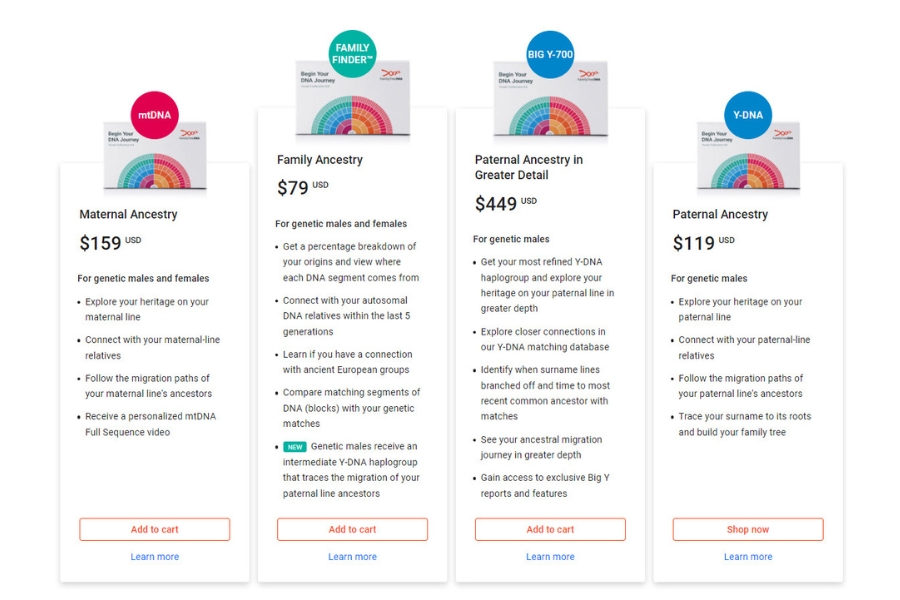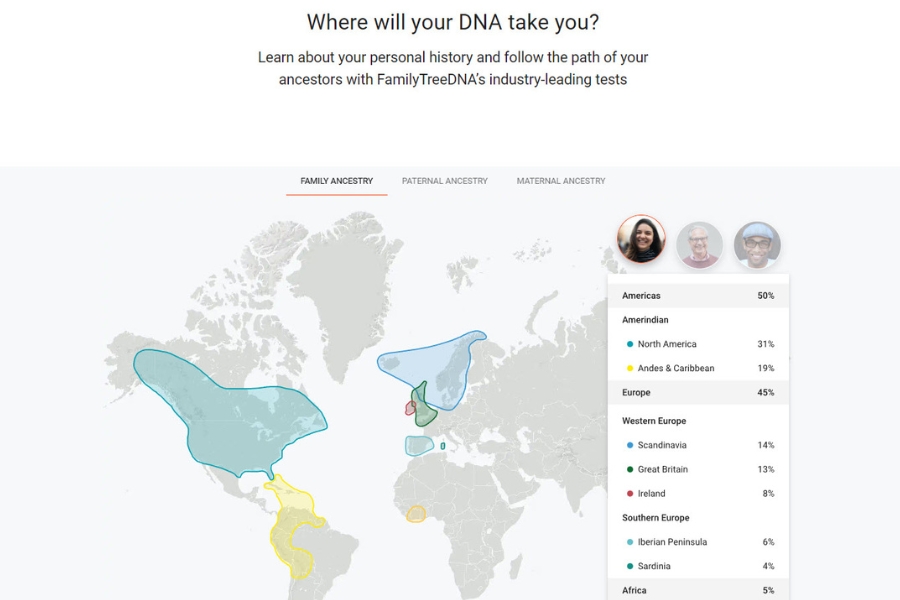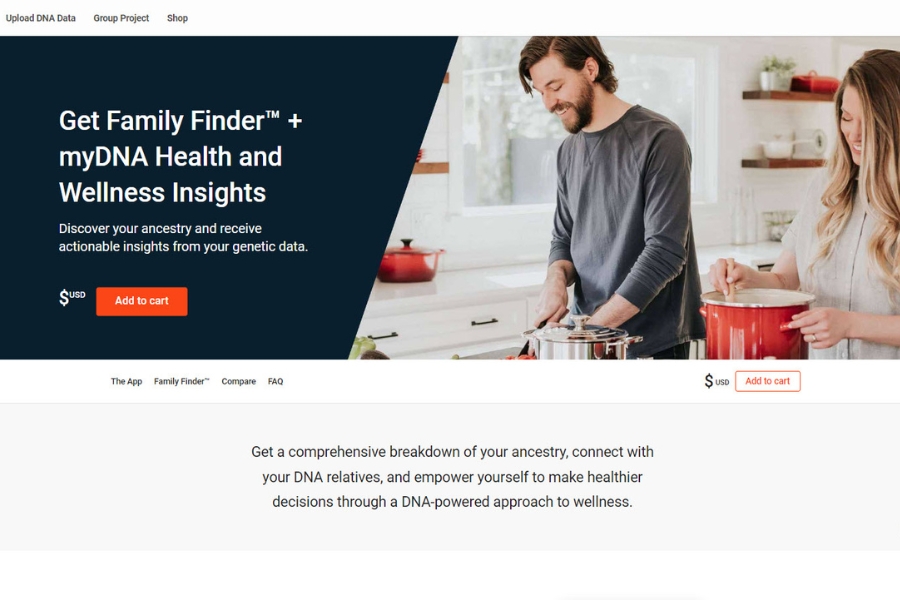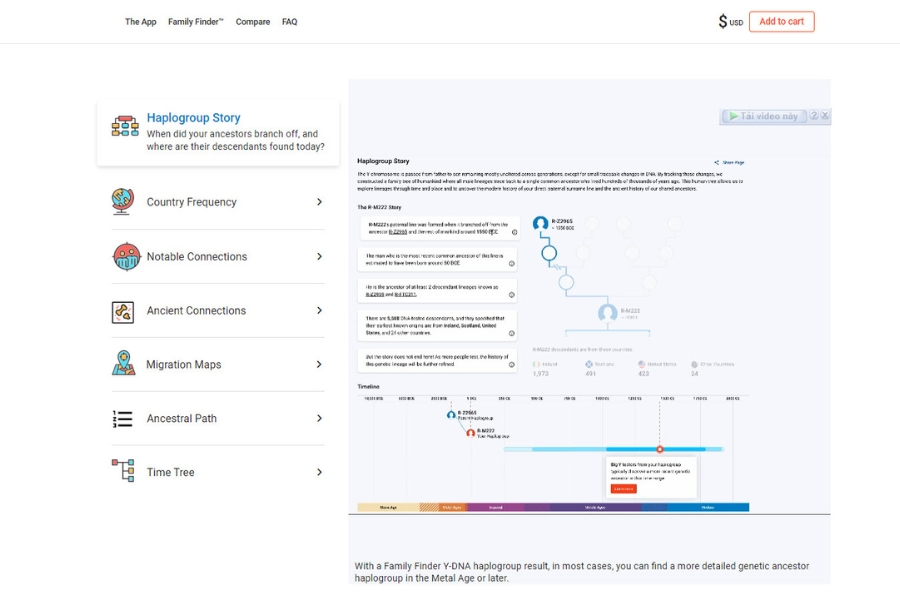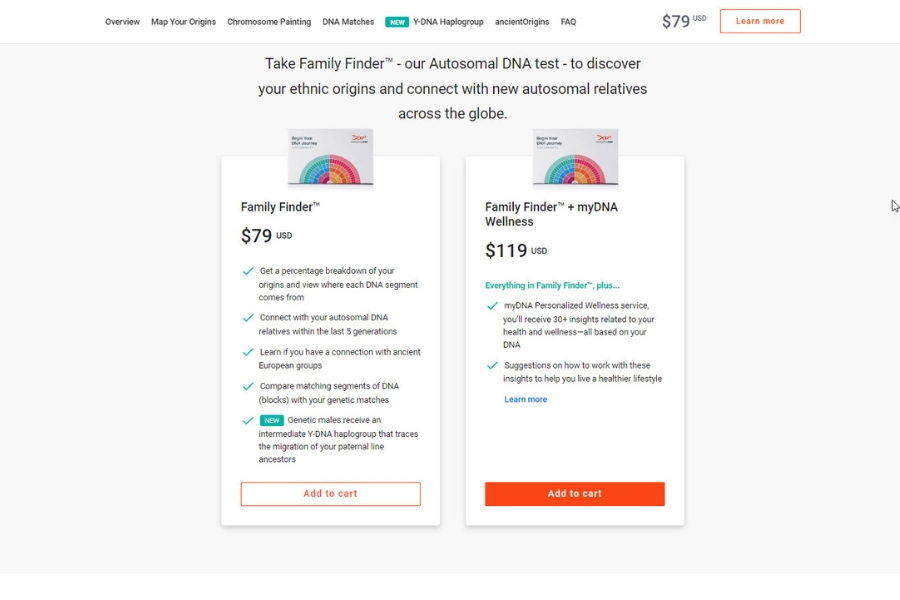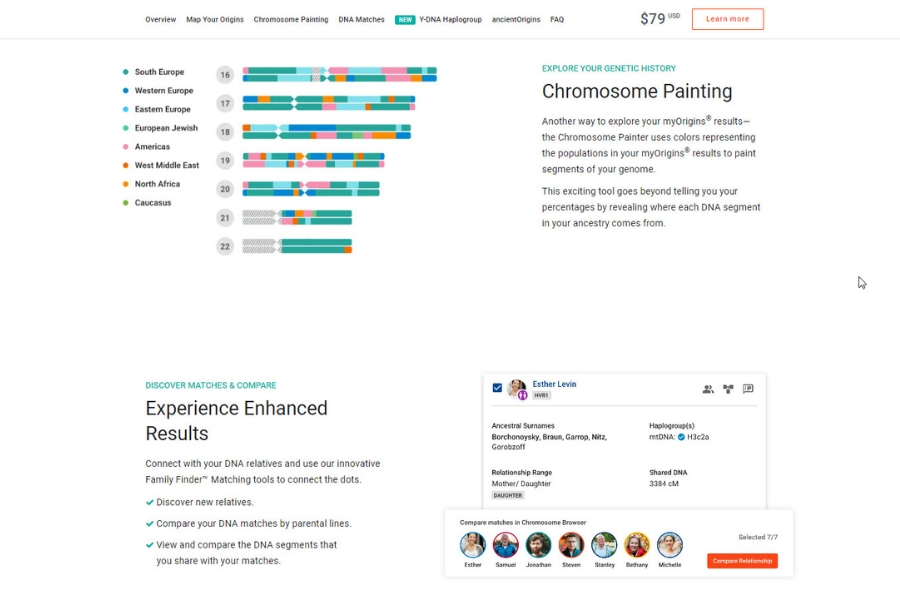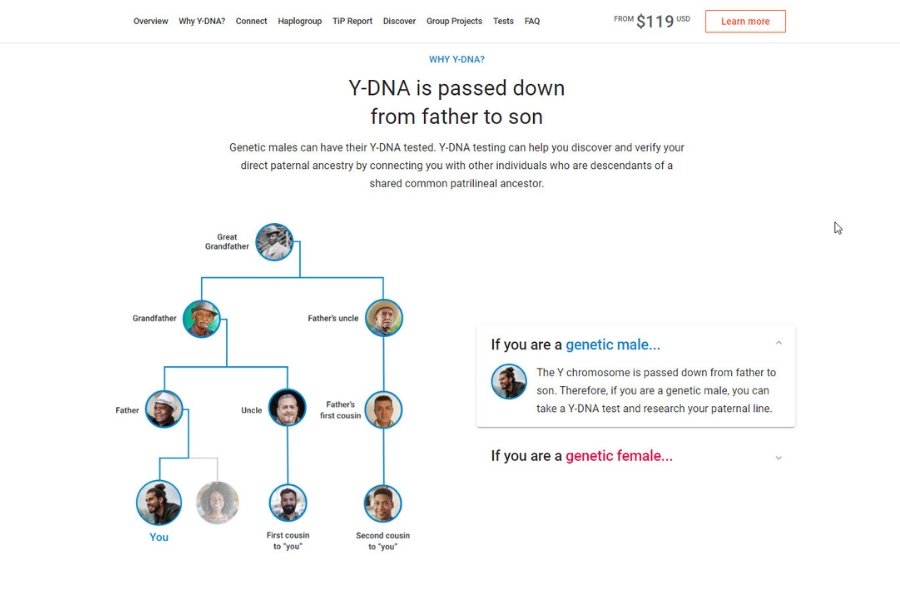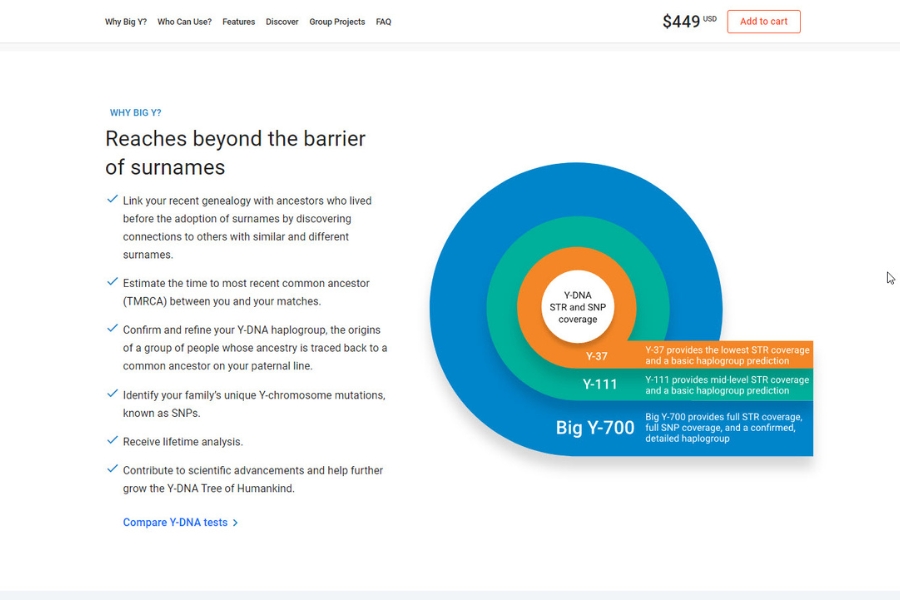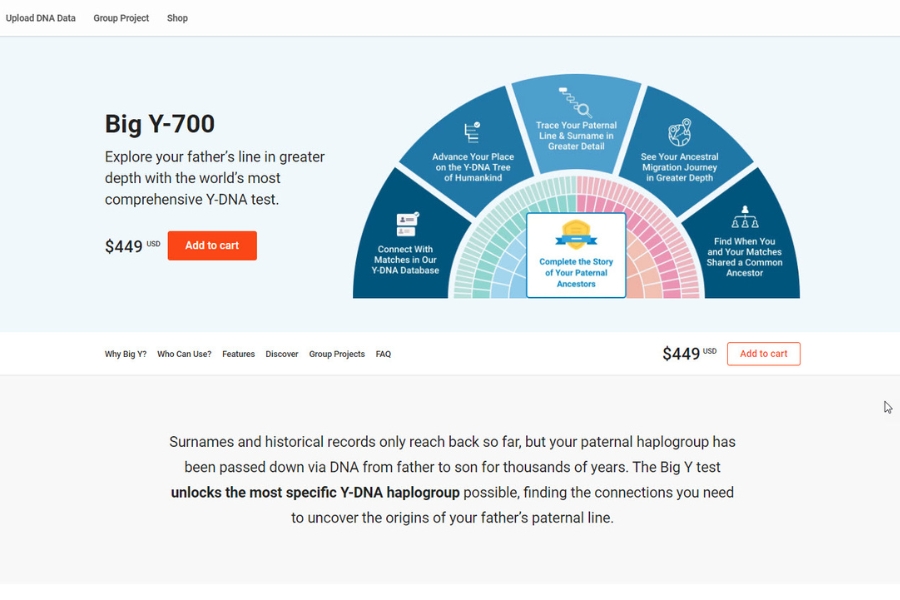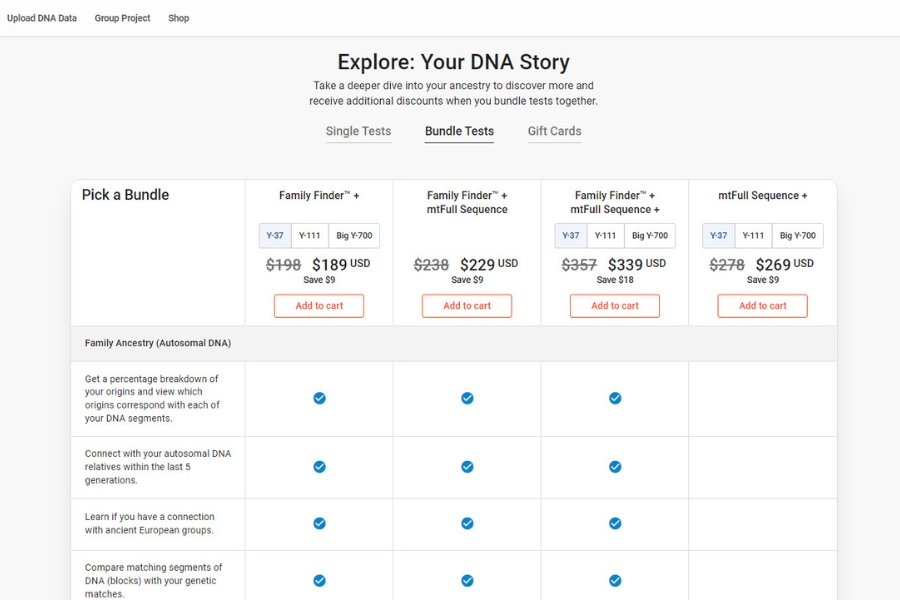Table of Contents
ToggleIntroduction to FamilyTree DNA
My journey into the depths of my ancestry began with a simple curiosity about my roots. This eagerness to understand my lineage led me to FamilyTree DNA, a name that has become synonymous with genetic testing and genealogical discovery. Founded in the year 2000, FamilyTree DNA has established itself as a pioneer in the field, offering an array of DNA tests that have helped individuals around the globe uncover their familial past and connect with their genetic present.
From the onset, my experience with FamilyTree DNA was marked by a sense of anticipation. I was not only intrigued by the potential to unravel my own story but also by the opportunity to contribute to a growing community of genealogy enthusiasts. FamilyTree DNA is not just a service; it’s a portal to the past, a bridge to our ancestors, and a guide for future generations seeking to understand their heritage.
As I embarked on this fascinating journey, I resolved to share my experiences and insights with others who might be on the cusp of their own ancestral quests. The comprehensive services offered by FamilyTree DNA have the power to illuminate the past, and I was eager to delve into the details of how these services could unlock the secrets held within our DNA.
Understanding DNA Testing
To truly appreciate the offerings of FamilyTree DNA, it’s essential to grasp the fundamentals of DNA testing. DNA, or deoxyribonucleic acid, is the hereditary material in humans and almost all other organisms. Every cell in a person’s body has the same DNA, and it is this DNA that carries the genetic instructions for growth, development, functioning, and reproduction.
DNA testing, which involves analyzing an individual’s genetic code, has become an indispensable tool for discovering ancestry. By extracting and examining the DNA from a simple cheek swab or saliva sample, scientists can glean vast amounts of information about a person’s genetic history. This process can reveal ancestral links, trace lineage, and even identify genetic predispositions to certain health conditions.
The science of genetics is complex, but the principles underlying DNA testing are remarkably accessible. By focusing on specific segments of DNA that are known to vary among individuals, geneticists can pinpoint markers that are informative for genealogical purposes. These markers serve as signposts that can trace back generations, connecting us to our distant relatives and ancestral origins.
Types of DNA Tests Offered by FamilyTree DNA
Autosomal DNA Tests
FamilyTree DNA’s autosomal DNA test, known as the Family Finder, is a comprehensive tool that analyzes the DNA inherited from both maternal and paternal lines. This test evaluates thousands of genetic markers spread across all 22 autosomal chromosomes to provide a broad picture of one’s ethnic makeup and connections to potential relatives.
Y-DNA Tests
The Y-DNA test is specifically designed for individuals interested in tracing their paternal lineage. Since the Y chromosome is passed down from father to son relatively unchanged, this test is a powerful way for men to follow their direct paternal line, sometimes reaching back thousands of years. FamilyTree DNA offers several levels of Y-DNA testing, each examining a different number of markers for more refined results.
mtDNA Tests
Similarly, the mtDNA test focuses on mitochondrial DNA, which is passed down from mother to children of both sexes. This type of testing can reveal information about one’s direct maternal line. The mitochondrial DNA changes very slowly over time, making it a reliable source for tracing ancestry back through many generations.
FamilyTree DNA’s suite of DNA tests is designed to cater to diverse genealogical needs. Whether one is looking to explore their paternal or maternal ancestry, find distant cousins, or understand their ethnic background, these tests provide a wealth of information that can help paint a detailed picture of one’s ancestral past.
Ancestry and ethnicity estimates on FamilyTree DNA
Delving into the ancestral origins and ethnicity estimates provided by FamilyTree DNA was like opening a time capsule that held the key to my family’s migratory history. The results from the autosomal DNA test, in particular, provided a fascinating pie chart of ethnicity percentages, offering insights into the geographic regions where my ancestors may have lived.
The ethnicity estimates are derived from comparing my DNA to reference populations from around the world. FamilyTree DNA maintains a comprehensive database of genetic information that helps to pinpoint the regions where my ancestors may have originated. This data, in turn, informs the creation of a detailed ancestral map, visually representing the confluence of cultures and migrations that led to my existence.
The ancestral origins feature is not just a static report; it’s a dynamic and evolving narrative of one’s genetic heritage. As more people are tested and the database grows, the resolution of ethnicity estimates becomes finer, potentially revealing more specific regional affiliations and historical context.
Functions and Tasks
1. Ancestry Estimation:
- Ethnicity Estimate: FamilyTreeDNA breaks down your genetic makeup by percentage across various global populations. It’s like getting a pie chart of your heritage.
- Family Finder: This feature connects you with relatives based on shared DNA. It’s not just about finding third cousins twice removed; it’s a goldmine for anyone building a family tree.
2. Ethiopian Estimates:
- Specifically, within the broader ancestry tests, FamilyTreeDNA can pinpoint Ethiopian heritage. This is crucial for people with Ethiopian roots wanting to understand their lineage more deeply or connect with relatives.
Advantages
1. Comprehensive Ancestry Features:
- You’re not just getting a “you’re this percent from this region” spiel. FamilyTreeDNA offers detailed reports, including migration paths your ancestors might have taken.
2. Connection with Distant Relatives:
- The database is extensive. If your DNA matches with someone else in their database, you get to know. It’s networking, but for family trees.
3. Ethiopian Heritage Focus:
- Not all DNA services dive deep into African ancestries with precision. FamilyTreeDNA’s focus on Ethiopian estimates is a standout feature for individuals with such backgrounds, offering them a chance to explore their heritage in detail.
Disadvantages
1. Privacy Concerns:
- DNA testing is personal. Despite assurances, there’s always a lingering question about data security. Who else is seeing this information? It’s a valid concern in the age of data breaches.
2. Accuracy and Specificity:
- While FamilyTreeDNA does a bang-up job with broad strokes, the finer details, especially in highly mixed or less-researched populations, might be a bit fuzzier. This isn’t unique to them, but it’s worth noting.
3. Cost:
- Quality comes at a price. While FamilyTreeDNA offers a range of tests, the costs can add up, especially if you’re diving into detailed ancestry and health insights.
In essence, FamilyTreeDNA offers a powerful tool for anyone looking to dig into their roots, connect with relatives, or just satisfy curiosity about their genetic makeup. The Ethiopian estimates are a cherry on top for those with such heritage, providing a deeper connection to their ancestry. But, as with all things, there are trade-offs, primarily concerning privacy and cost. Like in marketing, it’s all about weighing the benefits against the costs and making the call that’s right for
Connect families and connect with loved ones on FamilyTree DNA
One of the most exhilarating aspects of my DNA journey with FamilyTree DNA was the family matching feature. The thrill of discovering genetic relatives I never knew existed was an experience that transformed my understanding of family. The Family Finder test matched my autosomal DNA with other users in the database, identifying potential relatives based on shared DNA segments.
What made this feature particularly compelling was the ability to connect with these matches. FamilyTree DNA provides various tools to reach out and establish contact with newfound kin. Through a secure messaging system, I was able to initiate conversations, exchange family stories, and even share photos and documents.
The potential for connecting with relatives through FamilyTree DNA is vast. Some users have found close family members, such as siblings or first cousins, while others have connected with more distant relatives who share common ancestors from many generations ago. Each connection offered a new piece of the puzzle in my family history, providing context and depth to the names and dates I had gathered from traditional genealogical research.
Functions and Tasks
1. Connect Family:
- Family Matching System: It sorts your matches into paternal and maternal lines when both parents have tested, making it easier to understand how you’re connected.
- Tree Builder: A tool to build out your family tree using your DNA results and historical records. It’s like piecing together a puzzle of your ancestry.
2. Connect with Loved Ones:
- Relative Finder: This feature finds and connects you with relatives based on shared DNA segments. It’s about discovering cousins, second cousins, or even more distant relations you never knew you had.
- Messaging System: Once you’ve found a match, FamilyTreeDNA provides a platform to reach out and connect, share stories, or exchange information securely.
Advantages
1. Discovering Family Connections:
- These features are fantastic for uncovering relatives and ancestors you may not have been aware of, bridging gaps in your family history.
2. Building Comprehensive Family Trees:
- The integration of DNA results with family tree building is a game-changer. It provides a more accurate and extensive understanding of your lineage.
3. Engaging with a Global Community:
- The platform isn’t just about connecting with direct relatives; it’s about being part of a broader community of people interested in genealogy and ancestry.
Disadvantages
1. Privacy and Security:
- The idea of sharing your genetic information can be daunting. While FamilyTreeDNA claims high levels of data protection, privacy concerns remain a significant consideration for many users.
2. Emotional Preparedness:
- Discovering unexpected relatives or truths about your ancestry can be emotionally challenging. It’s a journey that might uncover surprises not everyone is ready for.
3. Dependence on User Participation:
- The effectiveness of connecting with family hinges on the participation of other relatives in the database. If your family members haven’t used the service, your results might be limited.
In sum, FamilyTreeDNA’s “Connect Family” and “Connect with Loved Ones” features offer a unique and powerful way to explore and expand your understanding of your family history. They bridge the past with the present, enabling you to build a more detailed picture of your ancestry. However, it’s important to navigate these waters with consideration for privacy and emotional readiness. The journey into your genetics and family history can be incredibly rewarding, but like any journey, it’s wise to prepare for all possible outcomes.
Explore DNA projects and collaborative research on FamilyTree DNA
FamilyTree DNA stands out not only for its individual testing services but also for its support of DNA projects and collaborative research. These projects are specialized groups led by volunteer project administrators who are passionate about specific areas of genealogical research, such as surname studies, geographic-based projects, or haplogroup exploration.
Joining a DNA project was a natural next step for me, as it aligned with my desire to delve deeper into the specifics of my genetic heritage. By becoming part of a project, I was able to contribute my DNA results to a collective pool, enhancing the research potential for all members involved. Collaboration within these projects often leads to groundbreaking discoveries and the establishment of new connections among members with shared ancestry.
The DNA projects at FamilyTree DNA are a testament to the power of collective endeavor. Through the aggregation of data and the shared expertise of project members, these groups are able to identify patterns, trace lineage connections, and provide a richer understanding of historical migrations. The collaborative nature of these projects also fosters a sense of community among participants, further enriching the genealogical journey.
Functions and Tasks
DNA Projects:
- Group Participation: DNA projects are organized around a common lineage or interest, such as surname projects, haplogroup projects, or geographical ancestry. Participants can join projects that resonate with their research goals.
- Shared Research: By joining a project, you contribute your DNA data to a pool that researchers and genealogists analyze to find patterns, trace lineages, and explore historical migrations.
- Community Insights: Projects often have forums or platforms for members to discuss findings, theories, and provide mutual aid in genealogical research.
Collaborative Research:
- Pooling Resources: Collaborative research involves pooling data, expertise, and sometimes funding, from multiple sources (individuals, organizations, etc.) to tackle broader questions in genealogy and genetics.
- Advanced Analysis: Through collaboration, participants can access more sophisticated analyses of their DNA, benefiting from the collective expertise of the community and advanced research tools.
- Publication and Sharing of Findings: Results from collaborative research projects are often shared within the community or published, contributing to the broader field of genetic genealogy.
Advantages
1. Deep Dives into Specific Interests:
- DNA projects allow for focused research on very specific topics or lineages, offering insights that broad tests cannot.
2. Sense of Community:
- There’s a strong community aspect, where you can engage with others who share your interests or backgrounds, offering support and camaraderie.
3. Accelerated Learning and Discovery:
- Collaborative efforts can lead to faster discoveries and insights, thanks to shared resources and expertise.
4. Contribution to Science:
- By participating, you’re not just learning about your ancestry; you’re contributing to scientific research that can illuminate human history and migration patterns.
Disadvantages
1. Privacy Concerns:
- Joining projects means sharing your genetic information with a group. While there are privacy safeguards, the thought of sharing such personal data can be unsettling for some.
2. Overwhelming Information:
- For those new to genealogy, the depth and breadth of information in these projects can be overwhelming. It requires a learning curve to fully benefit from participation.
3. Emotional Impact:
- Discoveries made through these projects can sometimes be surprising or unsettling, challenging one’s sense of identity or family history.
4. Dependence on Participation:
- The success of DNA projects and collaborative research heavily depends on the active participation of its members. Low engagement can slow down or limit the research outcomes.
In essence, DNA projects and collaborative research at FamilyTreeDNA offer a rich, engaging platform for those keen to dive deeper into their genealogy and contribute to the broader understanding of human genetics. The community aspect and potential for significant discoveries are major pluses. However, potential participants should weigh these benefits against concerns over privacy and the emotional readiness for whatever they might uncover. It’s a journey of discovery, filled with both personal and collective rewards.
Advanced Tools for DNA Analysis and Interpretation
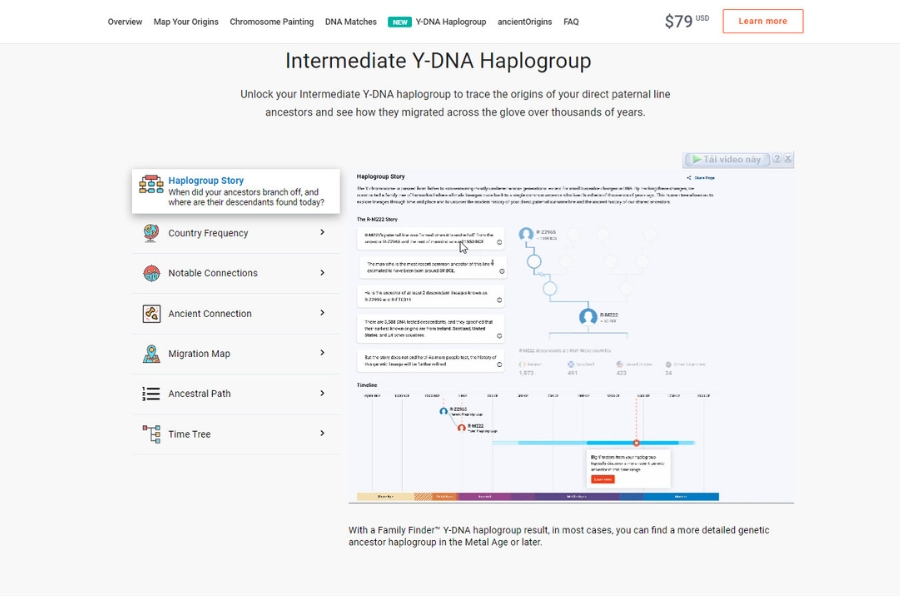
FamilyTree DNA – Leading Autosomal DNA, Y-DNA, and mtDNA Testing Service
Harnessing the full potential of DNA testing requires a robust set of tools for analysis and interpretation, and FamilyTree DNA excels in this regard. The platform offers an array of advanced tools that enabled me to take a deep dive into my genetic data and extract even more meaning from my results.
One such tool is the Chromosome Browser, which allows for a graphic representation of the chromosomes shared between matches. This tool was instrumental in helping me visualize where my DNA intersected with that of my relatives, providing a clear picture of our genetic connections. The browser also facilitated the identification of common ancestors by pinpointing the segments of DNA that we shared.
FamilyTree DNA also offers a feature known as myOrigins, which provides a detailed breakdown of my ethnic and geographic ancestry. This tool expanded on the initial ethnic percentages by offering a more nuanced view of my ancestral origins, including information on trace regions that may only represent a small fraction of my DNA but are nonetheless significant in understanding my family’s past.
The advanced tools provided by FamilyTree DNA empowered me to become an active participant in the interpretation of my genetic data. Rather than being a passive recipient of information, I was able to engage with my DNA results, explore various hypotheses about my ancestry, and craft a narrative that was both scientifically grounded and personally meaningful.
Functions and Tasks
1. Chromosome Browser:
- Comparison: Allows you to visually compare your DNA segments with those of your matches to see where you share common ancestry.
- In-depth Analysis: Provides a tool for deeper analysis of genealogical relationships, helping to pinpoint how you might be related to your matches.
2. Maternal & Paternal Lineage Testing:
- Deep Ancestry: These tests (mtDNA for maternal, Y-DNA for paternal) trace your direct lineages, offering insights into the ancient origins of your maternal and paternal lines.
- Haplogroup Information: Provides detailed haplogroup assignments, tracing your ancestors’ migration patterns thousands of years back.
3. Family Matching System:
- Integrated Analysis: Combines autosomal DNA results with Y-DNA and mtDNA haplogroup information to refine how matches are related to you.
- Filtering Options: Allows you to filter matches by relationship type, shared surnames, and more, making it easier to navigate your connections.
4. Advanced Matching Tools:
- Multiple Test Comparison: Enables comparison across different types of DNA tests (autosomal, Y-DNA, mtDNA) for comprehensive matching.
- Customizable Searches: Offers the ability to conduct searches based on specific criteria, such as geographical locations or ancestral surnames.
Advantages
1. Precision and Depth:
- These tools offer a level of detail and specificity not found in basic DNA testing, perfect for breaking through genealogical brick walls.
2. Comprehensive Ancestral Insights:
- By integrating different DNA test results, you get a fuller picture of your ancestry, from recent relatives back to ancient ancestors.
3. Community and Connection:
- Advanced tools facilitate connections with closely and distantly related family members, fostering a sense of community and shared history.
4. Contribution to Research:
- Your participation, especially in lineage testing, contributes to the broader understanding of human migration and genetics.
Disadvantages
1. Complexity:
- The advanced nature of these tools can be daunting for beginners, requiring a learning curve to effectively interpret results.
2. Privacy Considerations:
- As with all DNA testing, there’s the concern of how your genetic information is stored, used, and shared, especially when diving deep into lineage testing.
3. Emotional Preparedness:
- The detailed insights gained can sometimes reveal unexpected or sensitive family information, which not all users might be prepared for.
4. Cost Factor:
- Advanced testing and tools often come at a higher price, which might not be feasible for everyone interested in delving deeper into their ancestry.
FamilyTreeDNA’s Advanced Tools for DNA Analysis and Interpretation are a goldmine for genealogy enthusiasts, offering unparalleled insights into one’s genetic heritage. They allow users to not just scratch the surface of their ancestry but to dive deep, exploring connections that span the globe and millennia. The level of detail and potential for discovery is incredible, but it’s important to approach with an awareness of the complexity, privacy implications, and emotional journey this exploration might entail.
Exceptional Customer Support at FamilyTree DNA
Throughout my exploration of my genetic history, I found the customer support at FamilyTree DNA to be exceptional. Whenever I encountered questions or needed guidance, the support team was readily available to assist me. Their responsiveness and expertise made the process of navigating my DNA results and the associated features much smoother.
The customer support representatives at FamilyTree DNA are well-versed in both the technical and genealogical aspects of DNA testing. They provided me with clear explanations of the testing process, helped me understand my results, and offered advice on how to make the most of the tools and resources available on the platform.
Moreover, the customer support team played a crucial role in ensuring that any concerns I had about privacy and data security were addressed. They explained the measures in place to protect my genetic information and assured me that my data was being handled with the utmost care. Their dedication to customer satisfaction and privacy reinforced my confidence in FamilyTree DNA as a reliable and trustworthy service.
Functions and Tasks
1. Inquiry Response:
- Email and Phone Support: FamilyTreeDNA provides both email and phone support to address customer inquiries and concerns.
- FAQs and Help Center: A comprehensive database of frequently asked questions and articles that help customers navigate common issues or queries on their own.
2. Account and Order Assistance:
- Order Tracking: Support for tracking the status of orders and kits.
- Account Management Help: Assistance with account setup, privacy settings, and understanding how to access and interpret test results.
3. Educational Resources:
- Webinars and Tutorials: Offers educational materials to help users understand their DNA results and how to use the platform’s tools effectively.
- Community Forums: Access to user forums for peer support and knowledge exchange.
4. Problem Resolution:
- Issue Escalation: A system for escalating issues that cannot be resolved through standard support channels.
- Feedback Collection: Mechanisms for collecting user feedback to improve services and support.
Advantages
1. Accessibility:
- Multiple channels of support (email, phone, FAQs) make it easy for customers to find help when they need it.
2. Self-Help Options:
- The robust FAQs and help center empower users to troubleshoot common issues on their own, potentially reducing wait times for support.
3. Educational Support:
- The availability of educational resources aids customers in making the most out of their DNA results, enhancing the overall service value.
4. Community Engagement:
- Access to a community of users provides a platform for shared learning and support, enriching the customer experience.
Disadvantages
1. Response Times:
- Depending on the volume of inquiries and the complexity of issues, response times can vary, leading to potential delays in receiving support.
2. Complexity of Issues:
- Given the technical and sensitive nature of DNA testing, some issues might require more detailed explanations than what is available through standard support channels, leading to customer frustration.
3. Overreliance on Self-Help:
- While self-help resources are beneficial, there may be an overreliance on them, potentially neglecting customers who need or prefer direct assistance.
4. Knowledge Gap:
- The effectiveness of customer support can sometimes depend on the representative’s knowledge or understanding of DNA science, which might vary, affecting the quality of assistance provided.
FamilyTreeDNA’s customer support is designed to be comprehensive, covering a wide range of needs from basic inquiries to complex problem-solving. The company clearly puts an emphasis on education and community, recognizing the importance of both in the customer journey. However, as with any service, there’s always room for improvement, especially in terms of response times and handling complex, sensitive inquiries with the depth and empathy they deserve. It’s a balancing act between empowering users to help themselves and providing direct, personalized support when it’s most needed.
Educational Resources for Learning About DNA and Genealogy
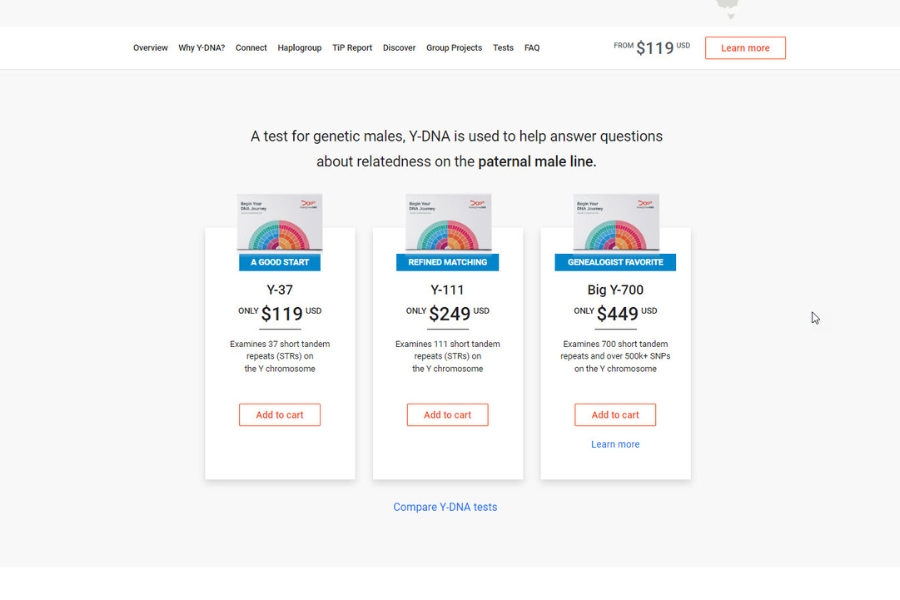
FamilyTree DNA – Leading Autosomal DNA, Y-DNA, and mtDNA Testing Service
As I delved deeper into the world of DNA and genealogy, I found the educational resources provided by FamilyTree DNA to be invaluable. The platform offers a comprehensive learning center that includes articles, webinars, and tutorials designed to educate users on various aspects of genetic genealogy.
The educational resources cover a wide range of topics, from the basics of DNA and inheritance to more advanced concepts such as understanding haplogroups and utilizing DNA matches in genealogical research. These materials are accessible to users of all levels, whether they are beginners just starting their genealogical journey or experienced researchers looking to expand their knowledge.
One of the standout features of FamilyTree DNA’s educational offerings is the series of webinars hosted by experts in the field. These live sessions provide an opportunity for users to learn directly from professionals, ask questions, and engage with the broader genealogical community. The webinars are also recorded and archived, allowing users to revisit the content at their convenience.
Functions and Tasks
1. Understanding DNA Results:
- Guides and Tutorials: Detailed explanations on how to interpret various DNA test results, including Y-DNA, mtDNA, and autosomal DNA tests.
- Video Tutorials: Visual aids that provide step-by-step instructions for navigating the platform and understanding your genetic information.
2. Deepening Genealogical Knowledge:
- Webinars: Scheduled online seminars that cover a range of topics from beginner to advanced levels of genealogical research.
- Articles and Blog Posts: Written materials that delve into specific aspects of genetic genealogy, historical contexts, and the science behind DNA testing.
3. Research Techniques:
- How-To Guides: Strategies for using DNA results in genealogical research, including how to connect with matches, interpret shared segments, and build family trees.
- Case Studies: Real-world examples showcasing how others have successfully utilized DNA testing to solve genealogical puzzles.
4. Community Learning:
- User Forums and Groups: Platforms for users to exchange questions, advice, and success stories, fostering a community of learning and support.
Advantages
1. Comprehensive Learning:
- The wide range of resources caters to both beginners and experienced genealogists, ensuring there’s something for everyone, regardless of their knowledge level.
2. Accessibility:
- Materials like webinars, video tutorials, and articles are accessible online, allowing users to learn at their own pace and convenience.
3. Practical Application:
- How-to guides and case studies provide practical, actionable advice that users can directly apply to their own research, making the abstract more tangible.
4. Community Support:
- The integration of community forums encourages peer-to-peer learning, offering diverse insights and solutions to common challenges.
Disadvantages
1. Information Overload:
- The sheer volume of resources can be overwhelming, particularly for newcomers to genetic genealogy, making it hard to know where to start.
2. Potential for Outdated Information:
- The fast pace of advancements in DNA science means that some resources may become outdated if not regularly updated, leading to confusion.
3. Accessibility Issues:
- While online resources are broadly accessible, individuals with limited internet access or those less tech-savvy may find it challenging to engage with these materials fully.
4. Dependency on Self-Motivation:
- The effectiveness of these resources largely depends on the user’s motivation to learn and engage with the material, which might not suit everyone’s learning style.
FamilyTreeDNA’s Educational Resources offer a rich landscape for exploration and learning in the field of genetic genealogy. They bridge the gap between receiving DNA results and understanding their profound implications for personal and familial history. The approach is inclusive, catering to a broad audience with varying degrees of familiarity with the subject matter. However, the challenge lies in navigating this wealth of information effectively and ensuring it remains current and accessible to all. Embracing these resources can significantly enhance the DNA journey, turning raw data into meaningful connections and insights.
Engaging with the Community Through Forums and Events
FamilyTree DNA fosters a vibrant community of genealogy enthusiasts, and engaging with this community through forums and events has been a highlight of my experience. The platform’s forums are a hub for discussion, where users can share their findings, seek advice, and collaborate on research.
The forums cater to a diverse array of interests, with topics ranging from beginner questions to advanced DNA analysis techniques. The sense of camaraderie within the forums is palpable, as members are eager to help one another and share in the excitement of genealogical discovery.
In addition to the online forums, FamilyTree DNA also hosts events that bring the community together in the physical world. These events, such as conferences and workshops, provide a space for users to meet face-to-face, learn from experts, and participate in hands-on research activities. The connections formed at these events often lead to lasting collaborations and friendships within the genealogy community.
Functions and Tasks
1. Question and Answer Exchange:
- Users can post questions and receive answers from other community members, including experienced genealogists and enthusiasts, making it a dynamic knowledge-sharing platform.
2. Discussion Threads:
- The forum hosts various threads on topics ranging from DNA test interpretation, genealogy research strategies, to understanding ethnic origins. This variety allows users to explore specific areas of interest deeply.
3. Sharing Success Stories:
- Members of the community can share their success stories, providing inspiration and practical examples of how DNA testing can be used to solve genealogical puzzles or connect with biological relatives.
4. Providing Feedback:
- The forum serves as a venue for users to provide feedback on the FamilyTreeDNA platform and services, offering suggestions for improvement.
5. Networking and Collaboration:
- It facilitates networking, allowing users to connect with potential relatives, collaborate on family research, or join specific DNA projects.
Advantages
1. Peer Support:
- One of the major advantages is the peer support system. Users can get advice and insights from others who have faced similar challenges, enriching the learning experience.
2. Diverse Perspectives:
- The forum brings together a global community, offering diverse perspectives on genealogy and DNA testing. This diversity can help users consider new approaches to their research.
3. Free Resource:
- Access to the community forum is typically free, making it an accessible resource for anyone interested in genetic genealogy, regardless of their financial investment in testing.
4. Inspirational Stories:
- Success stories shared by users can be highly motivational, showing the real-world impact of DNA testing on understanding family history.
Disadvantages
1. Information Overload:
- For newcomers, the vast amount of information and the wide range of discussion topics can be overwhelming, making it hard to find relevant information.
2. Variable Quality of Information:
- Given that the advice and insights are user-generated, the accuracy and quality of information can vary. Users need to discern and verify information independently.
3. Privacy Concerns:
- Participation in the forum requires a level of public engagement that might not be comfortable for all, especially when discussing personal family information.
4. Potential for Conflict:
- As with any online forum, there’s a potential for disagreements or conflicts among members, which can detract from the overall objective of supportive and constructive discussion.
FamilyTreeDNA’s Community Forum is a valuable resource for anyone navigating the complexities of DNA testing and genealogy. It offers a space for learning, sharing, and connecting with others on similar journeys. However, users should navigate the forum with awareness of its limitations, particularly regarding the quality of information and privacy considerations. The forum represents a microcosm of the broader genealogical community, showcasing the enthusiasm and collaborative spirit that drives this field forward.
Ensuring Privacy and Security of Your DNA Data
When embarking on my genetic journey, the privacy and security of my DNA data were paramount concerns. FamilyTree DNA understands the importance of these issues and has implemented robust measures to protect user information.
The company employs industry-standard security practices to safeguard genetic data, including encryption and secure storage protocols. Users also have control over their privacy settings, allowing them to decide how much information they wish to share and with whom.
FamilyTree DNA is transparent about its privacy policies and data usage. The company provides clear explanations of how user data is used for matching and research purposes, ensuring that users can make informed decisions about their participation. Additionally, FamilyTree DNA does not share genetic information with third parties without explicit consent from the user.
Functions and Tasks
1. Data Encryption:
- FamilyTreeDNA encrypts sensitive user data, including DNA test results and personal information, to protect it from unauthorized access.
2. Consent and Privacy Settings:
- Users have control over their privacy settings, allowing them to choose how much information they want to share with other users and researchers.
3. Opt-In Participation:
- Users must opt-in to participate in research projects or allow their data to be shared with third parties, ensuring that their consent is obtained before any data sharing occurs.
4. Transparency and Education:
- FamilyTreeDNA provides clear information to users about how their data will be used and shared, empowering them to make informed decisions about their privacy.
Advantages
1. User Control:
- FamilyTreeDNA prioritizes user control and consent, allowing individuals to determine how their genetic data is used and shared.
2. Transparency:
- The company is transparent about its data practices, providing clear information to users about how their data will be handled.
3. Research Opportunities:
- Opt-in participation in research projects allows users to contribute to scientific research while still maintaining control over their data.
4. Security Measures:
- Encryption and other security measures help protect user data from unauthorized access or breaches.
Disadvantages
1. Potential Risks of Data Sharing:
- Despite user control, there are still potential risks associated with sharing genetic data, including the possibility of re-identification or unintended consequences.
2. Limited Control Over Third-Party Use:
- While users can control how their data is used within the FamilyTreeDNA platform, they have less control over how third-party researchers or collaborators may use their data.
3. Privacy Concerns:
- Some users may still have concerns about the privacy of their genetic data, especially given the sensitive nature of the information.
4. Changing Policies:
- Policies regarding data privacy and security may change over time, potentially impacting users’ trust in the platform.
In conclusion, FamilyTreeDNA takes privacy and data security seriously, offering users control over their data and transparency about how it is used. While there are advantages to this approach, including user control and transparency, there are also potential risks and limitations, such as the possibility of unintended consequences and changing policies. Users should weigh these factors carefully when deciding whether to participate in genetic testing and research.
Managing Your FamilyTree DNA Account
Navigating and managing my FamilyTree DNA account has been a straightforward and user-friendly experience. The platform provides a dashboard that serves as a central hub for accessing my DNA results, managing matches, and exploring the various tools and resources available.
The account management features are intuitive, allowing me to easily update my personal information, adjust my privacy settings, and opt into or out of specific features. FamilyTree DNA also offers the option to download my raw DNA data, enabling me to keep a personal copy or use it with other genealogical services.
Regular updates and notifications from FamilyTree DNA keep me informed about new matches, project developments, and enhancements to the service. This proactive communication ensures that I am always aware of the latest opportunities to further my genealogical research.
Functions and Tasks
1. Profile Management:
- Users can update and manage their personal information, including contact details, billing information, and communication preferences.
2. Privacy Settings:
- FamilyTreeDNA provides options for users to control the visibility of their DNA test results and family tree, allowing them to choose who can view their information.
3. Kit Activation and Management:
- Users can activate DNA testing kits, track the status of their kits, and manage multiple kits associated with their account, such as those for family members.
4. Data Access and Download:
- FamilyTreeDNA allows users to access and download their raw DNA data, enabling them to analyze it with third-party tools or share it with other genetic testing services.
5. Subscription Management:
- For users with subscription plans, FamilyTreeDNA offers tools to manage subscription settings, including upgrades, downgrades, and cancellations.
Advantages
1. Personalized Control:
- Account management empowers users to personalize their genetic testing experience, allowing them to tailor settings and preferences to their liking.
2. Privacy Protection:
- By managing privacy settings, users can control who has access to their genetic data and family tree, enhancing their privacy and security.
3. Convenient Access:
- Account management provides convenient access to essential features and information, such as billing details, DNA data, and subscription settings.
4. Flexibility:
- Users have the flexibility to activate and manage multiple DNA testing kits within a single account, making it easy to coordinate testing for family members.
Disadvantages
1. Complexity for New Users:
- The multitude of settings and options within account management may be overwhelming for new users, leading to confusion or difficulty navigating the platform.
2. Potential for Misconfiguration:
- Users may inadvertently misconfigure privacy settings or subscription preferences, leading to unintended consequences or additional charges.
3. Limited Support:
- Users may encounter challenges or issues with account management that require assistance, but support resources may be limited or difficult to access.
4. Data Ownership Concerns:
- Despite user control over their genetic data, there may still be concerns about data ownership and how it may be used by FamilyTreeDNA or third parties.
In summary, Account Management on FamilyTreeDNA offers users valuable control and customization over their genetic testing experience, including privacy settings, kit management, and subscription options. While this provides numerous advantages, such as personalized control and privacy protection, users should be mindful of potential complexities and ensure they understand the implications of their settings and choices. Overall, effective account management can enhance the user experience and maximize the benefits of genetic testing.
Questions from interested users
- Question: How long does it take to receive DNA test results from FamilyTreeDNA? Answer: The processing time for DNA test results varies, but it typically takes around 6 to 8 weeks from the time FamilyTreeDNA receives your sample.
- Question: Can I upload DNA data from other testing companies to FamilyTreeDNA? Answer: Yes, FamilyTreeDNA allows users to upload raw DNA data from other testing companies, such as AncestryDNA and 23andMe, to their platform for further analysis.
- Question: How accurate are the ethnicity estimates provided by FamilyTreeDNA? Answer: Ethnicity estimates provided by FamilyTreeDNA are based on the analysis of your DNA compared to reference populations. While they can provide valuable insights into your ancestry, they are estimates and may not always be 100% accurate.
- Question: Can I connect with relatives through FamilyTreeDNA? Answer: Yes, FamilyTreeDNA offers a feature called Family Finder, which allows users to connect with genetic relatives based on shared DNA segments.
- Question: Are there any additional costs after purchasing a DNA testing kit from FamilyTreeDNA? Answer: There may be additional costs associated with certain features or services, such as advanced analysis tools or subscription plans. However, there are no ongoing fees required to maintain access to basic features like viewing your DNA test results.
- Question: How secure is my genetic data on FamilyTreeDNA? Answer: FamilyTreeDNA takes privacy and data security seriously, employing encryption and other measures to protect user data from unauthorized access.
- Question: Can I download my raw DNA data from FamilyTreeDNA? Answer: Yes, users have the option to download their raw DNA data from FamilyTreeDNA, which can then be uploaded to other genetic testing services or third-party analysis tools.
- Question: Does FamilyTreeDNA offer any health-related DNA testing? Answer: FamilyTreeDNA primarily focuses on ancestry testing, but they also offer limited health-related DNA testing, such as testing for certain genetic traits or predispositions.
- Question: How can I contact customer support at FamilyTreeDNA? Answer: Users can contact FamilyTreeDNA customer support through email or phone. Additionally, they have a comprehensive help center with FAQs and support articles.
- Question: Can I cancel my DNA testing kit order with FamilyTreeDNA? Answer: Yes, users can cancel their DNA testing kit order with FamilyTreeDNA before it has been processed and shipped. However, once the kit has been shipped, it cannot be canceled.
Conclusion and Recommendations for Using FamilyTree DNA
My journey with FamilyTree DNA has been a transformative experience that has enriched my understanding of my ancestry and connected me with a supportive community of fellow genealogy enthusiasts. The services offered by FamilyTree DNA, from the various DNA tests to the advanced tools and educational resources, have provided me with everything I need to explore my family history in depth.
For those considering embarking on their own genealogical journey, I wholeheartedly recommend FamilyTree DNA. Their commitment to providing accurate, detailed ancestry information, coupled with their dedication to user privacy and customer support, makes them a leader in the field of genetic testing.
Whether you are seeking to uncover your ancestral origins, connect with long-lost relatives, or contribute to collaborative DNA projects, FamilyTree DNA offers a comprehensive and rewarding platform for all your genealogical needs. Take the first step into your past and discover the stories that have shaped your present with FamilyTree DNA.
If you’re ready to start your own journey into the past and unlock the secrets of your DNA, explore FamilyTree DNA’s services today. Your ancestors are waiting to be discovered, and the answers to your genealogical questions are just a test away.

